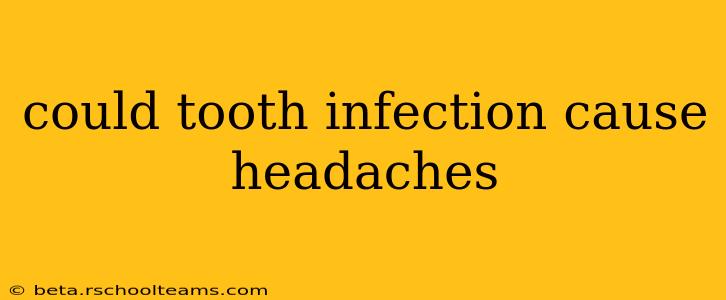Yes, a tooth infection, also known as a dental abscess, can absolutely cause headaches. The pain isn't just localized to your mouth; it can radiate and manifest as a headache, sometimes quite severely. This connection is due to the close proximity of the nerves and blood vessels in your mouth and head. Understanding this connection is crucial for proper diagnosis and treatment.
How Does a Tooth Infection Lead to Headaches?
The pain from a tooth infection causing headaches stems from several factors:
-
Nerve Inflammation: A tooth infection involves inflammation and infection of the pulp (the soft tissue inside the tooth). This inflammation can irritate the trigeminal nerve, a major nerve that runs from your brain to your face and jaw. The trigeminal nerve's branches supply sensation to your teeth, gums, and even parts of your forehead and temples. Irritation of this nerve can trigger headaches.
-
Pressure Buildup: An abscess, which is a pocket of pus caused by the infection, puts pressure on the surrounding tissues. This pressure can extend beyond the tooth itself, affecting nerves and blood vessels in the jaw and head, leading to throbbing pain and headaches.
-
Referred Pain: Pain originating from one area of the body can be felt in another area. This is called referred pain. The complex network of nerves connecting your mouth and head means the pain from a tooth infection can be "referred" to your head as a headache. This can make it difficult to pinpoint the exact source of the pain without proper dental examination.
-
Sinus Infection Connection: A severe tooth infection in the upper jaw can sometimes spread to the sinuses, resulting in a sinus infection. Sinus infections are well-known triggers of headaches, especially those located around the eyes and forehead.
What Kind of Headaches Can a Tooth Infection Cause?
The type of headache caused by a tooth infection can vary depending on the severity of the infection and the individual's sensitivity. Commonly reported headaches include:
- Throbbing headaches: These headaches are often characterized by a pulsating pain, intensified by the pressure from the abscess.
- One-sided headaches: The headache may be focused on the side of the head corresponding to the infected tooth.
- Headaches accompanied by jaw pain: This is a key indicator that the source of the pain might be dental.
Can a Tooth Infection Cause Other Symptoms Besides Headaches?
A tooth infection rarely presents with only headaches. Other symptoms may include:
- Severe toothache: This is the most common symptom, often described as sharp, throbbing, or constant pain.
- Sensitivity to hot or cold: Your infected tooth may be extremely sensitive to temperature changes.
- Swelling in the gums or face: This indicates the infection is spreading.
- Fever: A high fever is a sign of a more serious infection.
- Bad breath: The infection can produce a foul-smelling odor.
- Difficulty opening your mouth (trismus): This occurs due to the inflammation and muscle spasms in your jaw.
How Are Headaches from Tooth Infections Diagnosed and Treated?
If you are experiencing headaches and suspect a tooth infection, it's crucial to seek professional help. A dentist will conduct a thorough examination, including X-rays to diagnose the infection. Treatment typically involves:
- Root canal: This procedure removes the infected pulp and seals the tooth to prevent further infection.
- Extraction: In some cases, the tooth may need to be extracted.
- Antibiotics: Antibiotics are prescribed to fight the infection and reduce inflammation.
- Pain medication: Over-the-counter pain relievers like ibuprofen or acetaminophen may be helpful for managing pain and headaches, but it's crucial to consult a dentist first for appropriate management.
What if My Headache Doesn't Go Away After Dental Treatment?
Even after successful dental treatment, some residual discomfort may persist. If your headache continues or worsens despite treatment, consult your dentist or doctor to rule out other causes. It's important to address the underlying infection completely to ensure the headache resolves completely.
Can Other Dental Issues Cause Headaches?
Yes, other dental problems can also contribute to headaches. These may include:
- Temporomandibular joint (TMJ) disorders: Problems with the joint that connects your jaw to your skull can cause headaches, jaw pain, and clicking sounds in the jaw.
- Grinding or clenching teeth (bruxism): This can strain the jaw muscles and lead to headaches.
In conclusion, headaches can be a significant symptom of a tooth infection. If you experience headaches along with any of the other dental symptoms mentioned above, schedule an appointment with your dentist immediately for proper diagnosis and treatment. Early intervention is crucial for preventing the spread of infection and alleviating both dental pain and related headaches. Remember to always consult a healthcare professional for diagnosis and treatment.
